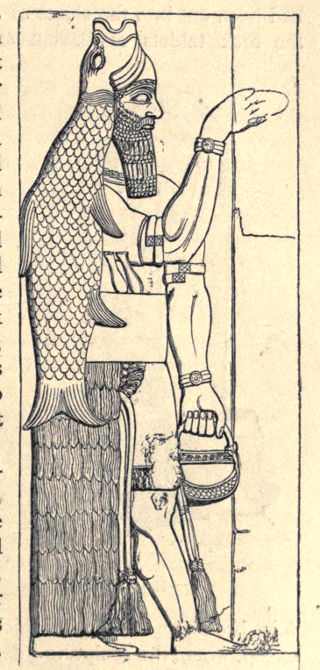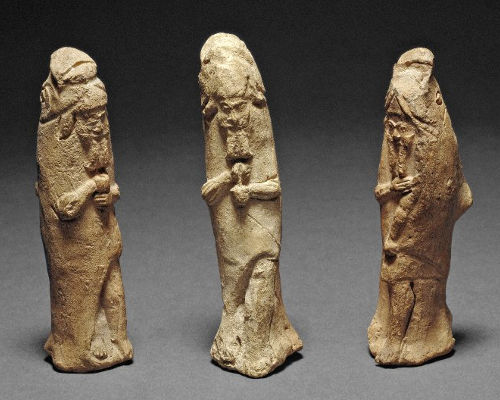Dagon
The name of the deity Dagon means “hidden” & “cloaked” in the Semitic languages & Egyptian, and also puns with “fish”. The Assyrian figurines called “Dagon priests” consequently wear fish cloaks.
Dagon puns in a nutshell
As usual, Dagon seems constructed from puns with official atributes, and there are also puns with spooky attributes. Dagon’s attributes can mostly be inferred from the many depictions of “fish cloak” figurines who are associated with Dagon for his fish pun.
- Dagon was a fertility god who discovered grain, because Semitic dgn means “grain”. 🡻
- Dagon also invented the plough, because Aramaic dgw means “plough”.
- Dagon figurines are often shown performing purification rituals, because Semitic dky means “cleaning” & “purifying”. (See the Nineveh water basin for examples.)
- Dagon figurines wear fish cloaks, because Semitic dg means “fish”. 🡻
- Dagon figurines wear fish cloaks, perhaps because Semitic dq means “curtain”. 🡻
- Dagon figurines wear fish cloaks, perhaps also because Egyptian jdg means “cloak”. 🡻
- Dagon figurines wear beards, because Semitic dqn means “beard”. 🡻
- Dagon is a spook symbol, because Semitic ṭkn means “deception”. 🡻
- Dagon is a spook symbol, because Egyptian dgj means “hidden”. 🡻
- Dagon is a spook symbol, because Semitic dq means “veil”. 🡻
- Dagon is a spook symbol, because Semitic dyq means “watching” & “watchman”. 🡻
- Dagon is a spook symbol, because Semitic dgl means “spy”. 🡻
Note: The N in Dagon is a Semitic grammar suffix which can be added to any word, so it’s not necessary for the pun words.
Dagon as a “fish” god
Wikipedia admits that Dagon is often interpreted as being derived from Semitic דג dg for “fish”, because there were many depictions of fish-men in Assyrian palaces. The current official explanation is with דג dg for “grain”. What Wikipedia doesn’t admit, as usual, is that it can be both at the same time: Dagon was a pun!
A long-standing association with a Canaanite word for “fish” (as in Hebrew: דג, Tib. /dɔːg/), perhaps going back to the Iron Age, has led to an interpretation as a “fish-god”, and the association of “merman” motifs in Assyrian art (such as the “Dagon” relief found by Austen Henry Layard in the 1840s). The god’s name was, however, more likely derived from a word for “grain”, suggesting that he was in origin associated with fertility and agriculture.
So far, so easy: Dagon sounds like the words for “fish” & “grain”.
Hebrew dg, dgn = Dagon, fish, grain
דג dg : fish, fishing — Old Hebrew (Strong)
דג dg : fish; related to Ugar. dg (= fish) — Hebrew (Klein)
דוג dwg : to fish — Hebrew (Klein)
דגה dgh : increase, caused to multiply; denominated from דג, hence lit. meaning ‘to multiply like fish’ — Hebrew (Klein)
דאג dˀg : to be anxious or concerned, to fear, dread, worried — Old Hebrew (Strong)
דגן dgn : corn, grain; related to Phoen. דגן, JAram. דגנא, Samaritan dīgan, Ugar. dgn (= corn, grain) — Hebrew (Klein)
דגן dgn : corn, grain (of cereals) — Old Hebrew (Strong)
Depictions with fish cloaks
But if you look at Assyrian figurines & friezes, you’ll notice that practically all depictions of fish people are showing regular humans just wearing fish cloaks. That is very unusual. All other half-animal creatures are actual hybrids (like the Nisroch eagle-men), so it’s not like Assyrian artists were unable to imagine or depict that.

Dagon relief, showing man with fish-skin cloak.
(from Nineveh, draw by Austen Henry Layard)

3 clay figurines of apkallu, men with fish-skin cloaks.
(from Nineveh, now in British Museum)
dg meaning “fish” & “cloak”
Can we do better than Wikipedia and official Assyriology, and explain the weird fish cloaks? If you look up the word root meanings, it’s perfectly simple: dg means both “fish” & “cloak”, and that’s why the figurines wear a fish cloak.
The only difficulty is that the meaning “cloak” is only attested for Egyptian. The Egyptian root dg means “cloak”, “cloaking”, “concealing”, but also “seeing”. Likely that’s because it does not mean concealment by hiding out of sight, but “concealment by cloaking”, which makes people see something else.
Egyptian dg = see, make see, conceal, cloak, cape
𓄔𓏤𓍵 jdg : (head) kerchief, cape, cloak — Egyptian (Vygus)
𓇋𓀁𓂧𓎼𓄔𓏤𓍱 jdg : cape, cloak — Egyptian (Vygus)
𓇋𓂧𓎼𓄿𓄔𓏤𓍵 jdg : head cloth; kerchief — Egyptian (TLA)
𓂧𓎼𓄿𓇋𓇋𓀃𓅪 dgj : hide — Egyptian (AED)
dgj : to hide oneself, to be hidden — Egyptian (TLA)
𓋴𓂧𓎼𓄿𓀃𓂻 sdgj : conceal from — Egyptian (AED)
𓋴𓂧𓎼𓀃𓂻𓏥 sdgw : hidden things — Egyptian (AED)
𓋴𓂧𓎼𓄿𓇋𓇋𓁻 sdgȝy : to conceal — Egyptian (Vygus)
𓋴𓂧𓎼𓄿𓁻 sdgȝ : to see, to show — Egyptian (Vygus)
𓂧𓎼𓁻 dgj : to behold, to see — Egyptian (TLA)
Theoretically, the words dg for “fish” and dg for “cloak” may even be related, via the meaning “skin”: dg could mean “fish”, because fish are cloaked in a special slippery & scaly skin. dg also means “grain”, perhaps for the protective chaff.
But officially, the “cloak” meaning was only used in Egyptian, and the “fish” meaning only in Mesopotamia. If that was the reality, and is not due to censoring of dictionaries, then it means that the Mesopotamian cryptocrats were using their foreign vocabulary to play a joke on their subjects. They probably told their subjects that Dagon was a fertility god, because of the pun with dg for “fish” & “grain”. But to the cryptocrats, Dagon was really a cryptocracy god, because of the pun with dg for “cloaking”.
Since the spook aristocrats are “cloaking” themselves all the time, it would make Dagon yet another “hidden ruler” pun.
Semitic dq for “fine curtain” & “veil”
There is a possible Semitic pun with the root dq for “fine” & “finely crushed”, which has the derivations “veil” & “curtain”. The meaning of “fine cloth curtain” occurs only once in the Bible, so it was perhaps a rare word. But since the spooks often used other rare words for “veil”, I wouldn’t rule it out though. The “cloak” fits the Dagon figurines better though.
There are other derivations dgn “veiled eye” and dqn “beard”, which are written much like Dagon.
Hebrew, Aramaic dq = fine, veil, curtain
Hebrew, Aramaic dgn, dqn = veiled eyes, beard
Semitic pun of dgn with ṭkn for “deception”
The cleanest spook pun of Dagon is with Semitic ṭkn for “deception” & “hoax”. It’s basically the meaning of spookery. This term is only found in Aramaic though, and not officially attested for Akkadian languages such as Assyrian.
However, Aramaic generally shares much vocabulary with Akkadian languages. The Sureth dialect of modern Aramaic is often even called Neo-Assyrian, and many of its modern speakers identify as Assyrians. It’s therefore possible that the root ṭkn was also found in Old Assyrian.
Aramaic ṭkn = deception, guile, hoax
טכן ṭkn : device, guile — Aramaic (CAL)
טכן ṭkn : to devise cunningly, put a great effort into; to be devised cunningly — Aramaic (CAL)
טוכן ṭwkn : guile; machination — Aramaic (CAL)
ܛܟܢ ṭkn : to wile, to beguile, to cheat, to fool, to delude — Syriac (AAF)
ܛܟܢܐ ṭknˀ : craft, cunning, device, guile, artifice; a stratagem, a ploy, an artifice; a deception, a hoax, a catch, a trick — Syriac (AAF)
Semitic pun of dgn with dgl for “lying” & “spying”
There’s another purely Semitic pun: The phoneme N is very close to L, only the tip of the tongue moves a little bit. Consequently, the letters N & L were almost identical in Phoenician script, and were often confused. Thus, dgn for “Dagon” is very close to dgl for “lying” & “spying”, in both spelling & pronunciation. That could be related to Greek διαγγελος diaggelos for “spy” & “informant”, and even to Egyptian dg for “seeing”.
In any case, a “spy” pun would complement the “fish cloak” symbolism very well. Because the elites mostly spy on their own subjects, this would also be a typical “hidden ruler” pun.
Aramaic dgl = lying, deceiving, treachery
Akkadian dgl = watching, spying
dāgilu : an observer, an onlooker, a looker, a watcher, a spy, a spectator, a viewer, a bystander; lā dāgilu: unobservant, unseeing, blind — Akkadian (AAF)
Semitic pun of dgn with dyq for “watchman”
Finally, there is an Aramaic root dyq meaning “observing” & “watchman”, which may also play into Dagon’s punnery.
